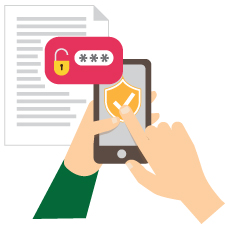 |
|
Efforts continued to collect views from stakeholders on the development of a Patient Portal under Stage
Two Development of the Electronic Health Record Sharing System. This issue highlights views and
suggestions of representatives from the public and private healthcare sectors. |
|
|
| |
| Further to the engagement activities organised for patient groups in February 2018, meetings were held with
healthcare representatives from the public and private sectors, as well as non-governmental organisations
(NGOs) in March 2018 at the Central Government Offices as part of a consultancy study to find out
stakeholders’ needs, expectations and concerns regarding the development of a Patient Portal. |
| |
| Discussions were focused on three key aspects of the Portal, including access to electronic health records (eHRs) and health information by users, value-added functions and data sharing restriction features. |
| |
| Access to eHRs and Health Information
From healthcare professionals’ perspective, there are genuine needs and benefits for patients to access their health information so as to better manage their health. As many representatives pointed out, “In fact, some of the health information, such as medications and appointments are already accessible and kept by patients using their own ways. There is no question that allowing them more convenient access to such information via the Patient Portal will facilitate their self-management. This will also help us much in taking care of our patients as it is not uncommon for them to forget important information like allergies.” |
 |
| Secure access to eHRs and health information via the Patient Portal |
|
|
|
| |
| Representatives considered that data which is important to patients’ health and safety and more easily understood by most, such as medications, allergies and adverse drug reactions, should be made available first. Information that is of high value to a sizable user group, such as childhood immunisation records, may also be included. For records that are more complicated or require professional interpretation or analysis, such as laboratory results and diagnosis, they were not suggested by most. “There is always the possibility that a patient who does not know how to interpret the data may become unnecessarily distressed and pessimistic,” a representative remarked. |
| |
|
In addition to viewing patient’s own records, representatives saw the potential of the Patient Portal serving as an integrated platform for accessing general health information which is now only available at multiple and scattered locations. It was also considered useful and effective if the Portal can further deliver targeted information and health promotion materials, e.g. vaccination and screening programmes, based on user profiles. Nonetheless, representatives reminded that caution needs to be taken against potential information overload to users.
|
| |
| Value-added Functions |
| In exploring the potential functions of the Patient Portal, it was agreed that priority should be given to those that can most engage and empower patients, or facilitate carers in managing patients’ health. |
| |
| “Functions like medication schedules and appointment reminders are helpful, particularly for the elderly patients,” said an NGO representative. This was concurred by public sector representatives, “if patients can better adhere to their medication or treatment plans, the chances of unplanned admissions will likely be reduced. This also facilitates better utilisation of our limited public healthcare resources.” |
| |
| Representatives further suggested including functions for patients to input their health vitals, such as blood pressure readings, and other social information like smoking or drinking habits, to promote self-care and primary care at the community level. While patients’ expectation needs to be well managed that such information will not be monitored in real time, value-added features such as health tips and system-generated alerts based on the inputted data may be provided. |
| |
| As highlighted by most representatives, the design and functions of the Portal should centre on the needs of the target users. It should also be simple, easy and convenient to use. |
| |
| Data Sharing Restriction |
| Regarding the introduction of additional control on data sharing, representatives acknowledged the privacy concerns and needs of some patients yet emphasised their concerns on patient safety. Some expressed that restricting healthcare professionals’ access to certain clinical information may impede the drawing up of treatment plans most suitable for patients. Medico-liability is another issue that needs to be addressed. |
| |
| Some representatives were more worried that patients themselves are not fully aware of the potential consequences of withholding their records. “The risks and implications need to be clearly spelt out if patients are given the choice to restrict data access. In any case, as a duty of professional care, we will enquire as much information as possible from our patients when taking care of them,” a representative stressed. |
| |
| Patient Portal: Improving Efficiency and Healthcare Quality |
| By and large, healthcare representatives were supportive to the development of the Patient Portal. As a representative of a healthcare professional body remarked, “the values of eHR sharing and the Patient Portal lie in promoting communication and collaboration between healthcare practitioners and patients in co-managing health, which in turn improves the efficiency and quality of healthcare services for patients. Local healthcare professionals and patients should be encouraged to take part and make the most of it.” |
| |
 |
Attended organisations on 8 and 13 March 2018 include the following:
Hong Kong Private Hospitals Association, Quality Healthcare, Hong Kong Society of Medical Informatics,
Tung Wah Group of Hospitals, Senior Citizen Home Safety Association and Po Leung Kuk |
| |

|
| |
|

